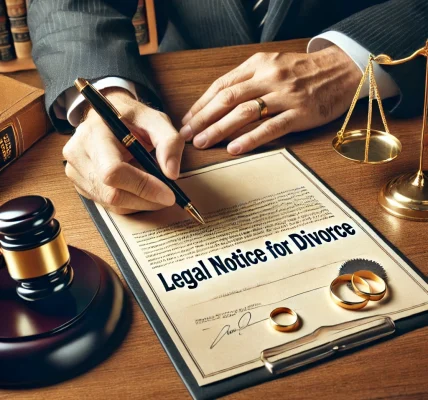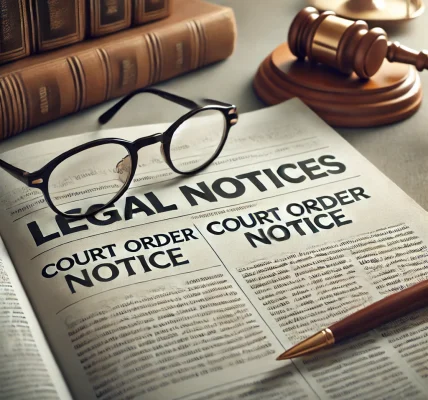- Homepage
- Legal Notice
- Private Company Notice: What You Need to Know
Private Company Notice: What You Need to Know
Table of Contents
Private Company Notice : Key Insights and GuidelinesA private company notice is a formal communication issued by a company, often to inform stakeholders about its decision to exercise its right to refuse the transfer of stocks. It serves as a legal tool to address potential disputes or enforce company policies.For instance, a company might issue a notice to a shareholder regarding the transfer of shares, ensuring compliance with legal and internal regulations.
If you need assistance in drafting or sending a legal notice to a company, public-noticeads.in is your reliable partner. We specialize in helping individuals and legal professionals draft and publish legal notices across India. With a focus on legal accuracy and efficiency, we ensure your notice meets all requirements. Visit public-noticeads.in to get started today!
Format of a Legal Notice for a Corporate Company
[Your Name]
[Your Address]
[City, State, Zip Code]
[Date]
[Company Name]
[Company Address]
[City, State, Zip Code]
Subject:
Legal Notice for Breach of Contract
Dear [Company Name], I hope this message finds you well. I am writing to formally bring to your attention certain issues related to our agreement dated [Date], which require immediate resolution to avoid further legal action.Introduction:
On [Date], I entered into a contract with [Company Name] for [specific services or details of the agreement]. My intention has always been to fulfill my obligations and contribute positively to our partnership.Complaints:
Unfortunately, I have identified instances where the terms of the contract have been breached. Specifically, [describe the nature of the breach, e.g., failure to pay for services, non-delivery of goods, etc.].Legal Grounds:
As per the terms outlined in our agreement, particularly under Section [X] – [Name of the Section], any breach constitutes grounds for legal action. I believe that the actions taken by [Company Name] do not align with the mutually agreed terms.Demands:
In light of the above, I hereby demand [specify your demands, e.g., rectification of the issue, payment of outstanding dues, etc.] within [reasonable timeframe, e.g., 14 days] from the date of receipt of this notice.Consequences:
Please note that failure to comply with the demands stated here will leave me with no choice but to pursue legal remedies, including initiating legal proceedings to recover damages for breach of contract.Your Contact Information:
I am open to resolving this matter amicably and can be reached at [your phone number] or [your email address] for further discussion. Sincerely, [Your Signature] [Your Typed Name] [Your Company/Organization, if applicable]Understanding and Sending a Legal Notice to a Company
A legal notice is a formal document used to communicate complaints, demands, or serious issues to a company’s management. It is typically sent in cases of disputes, contract breaches, or when legal action is being considered.Steps to Send a Legal Notice
- Identify the Reason: Clearly understand why you are sending the notice. Common reasons include breach of contract, failure to meet legal obligations, or other grievances.
- Consult a Lawyer: Seek legal advice to ensure the notice is drafted correctly and complies with applicable laws.
- Draft the Notice: Write a clear and concise notice, detailing the issue, referencing relevant laws, and stating your demands.
- Send the Notice: Deliver the notice through an official channel, such as registered mail or courier, to ensure proof of delivery.
Legal Rules for Sending a Notice to a Company
When sending a legal notice, it’s important to be aware of the relevant laws:- Civil Procedure Code (Section 80): Requires a two-month notice before taking legal action against government bodies or public officials.
- Indian Contract Act (Section 73): Deals with compensation for losses caused by a breach of contract.
- Consumer Protection Act (Section 2(1)(o)): Relevant for consumer complaints, often requiring a notice before filing a formal complaint.
- Companies Act (Section 434): Pertains to disputes handled by the National Company Law Tribunal (NCLT).
- Arbitration and Conciliation Act (Section 21): Requires informing the other party before initiating arbitration.
Essential Components of a Legal Notice
A well-drafted legal notice should include:- Clear Heading and Address: Ensure the notice is clearly labeled and includes accurate sender and recipient details.
- Relevant Laws: Specify the laws applicable to your case.
- Factual Background: Provide a detailed account of the issue, including dates and events.
- Statement of Complaints: Clearly outline the grievances prompting the notice.
- Legal Demands: Specify the remedies or actions you expect from the recipient.
- Supporting Documents: Attach relevant evidence, such as contracts or communication records.
- Deadline for Response: Set a reasonable timeframe for the recipient to respond.
- Consequences of Non-Compliance: Mention the legal actions that may follow if the demands are not met.
Responding to a Legal Notice: A Company’s Perspective
When a company receives a legal notice, it should:- Act Promptly: Respond quickly to avoid escalation.
- Seek Legal Advice: Consult a lawyer to understand the notice’s validity and draft an appropriate response.
- Acknowledge Receipt: Confirm receipt of the notice formally.
- Review Carefully: Examine the notice’s content thoroughly.
- Prepare a Response: Address each point raised in the notice.
- Consider Mediation or Arbitration: Explore amicable resolution options.
- Maintain Professionalism: Communicate respectfully and professionally.
- Document Everything: Keep records of all communications related to the notice.
When Legal Notices Escalate
If a legal notice does not resolve the issue, the matter may escalate to:- Civil Court: Filing a civil case to seek a legal remedy.
- Arbitration: Resolving the dispute through a neutral third party, if an arbitration clause exists.
- Consumer Court: Addressing consumer-related disputes through specialized courts.
Documents Required for a Legal Notice
To strengthen your legal notice, gather the following documents:- Copies of agreements or contracts.
- Communication records (emails, letters, etc.).
- Financial documents (invoices, receipts, etc.).
- Photographic evidence, if applicable.
- Legal references supporting your claims.
- Proof of delivery for the notice.
Conclusion
Issuing a legal notice to a company is a critical step in resolving disputes. It requires careful attention to legal details and proper documentation. Companies should respond professionally, as the situation may escalate to formal legal proceedings. A well-prepared notice can pave the way for negotiation or legal action, ensuring justice and resolution.FAQs About Legal Notices for Companies
-
- What should a notice include?Include key details such as the event’s location, date, and time, along with a clear description of the issue.
- How do you write a company notice?Example: “Dear [Manager’s Name], I am resigning from my role as [Job Title]. My last working day will be [Date].”
- What is a company notice?A formal document sent to directors about a board meeting, detailing the agenda, date, and time.
- What is a Notice to Explain (NTE)?A formal document given to an employee to explain alleged misconduct before any action is taken.
- How do you write an informative notice?Keep it concise, focusing on the main facts without unnecessary details.
- How do I give notice to my company?
- Check your employment contract.
- Inform your manager and key stakeholders.
- Submit a written resignation letter.
- What should a notice contain?Include the issuer’s name, title, date, subject, main message, and signature.
- What is a legal notice to a company?A formal document stating a legal complaint or demand, often the first step before legal action.
- What does “21 days’ clear notice” mean?It refers to the minimum notice period required before an Annual General Meeting (AGM).
- What is the typical notice period in India?It varies, typically 30 days for freshers and 60-90 days for mid-level or senior roles.
- How should a notice start?Begin with a clear statement of purpose, providing necessary background and details.
- What are the types of notices?Public notices, meeting notices, termination notices, rent increase notices, eviction notices, and default notices.
- Why are notices written?To inform people about important matters, often displayed on notice boards or published in newspapers.
- What is an information notice?A document requiring someone to provide specific details or documents, often used for tax purposes.
- How do you write a notice report?Include the organization’s name, the title “Notice,” and the date of issuance.
- What prompts a legal notice to a company?Breach of contract, failure to meet legal obligations, or actions causing harm.
- Can an individual issue a legal notice to a company?Yes, individuals can issue legal notices as a precursor to formal legal action.
- How should a company respond to a legal notice?Respond promptly, address the concerns, and seek legal advice for drafting a proper response.
- Are there specific laws for sending notices to companies?Yes, including CPC Section 80, Indian Contract Act Section 73, Consumer Protection Act Section 2(1)(o), Companies Act Section 434, and Arbitration and Conciliation Act Section 21.
- What documents are needed for a legal notice?Contracts, communication records, evidence, and legal references supporting your claims.
- How do I write a legal notice?Include names and details as per the law, key information, the sender’s address, and any consequences or issues to be discussed.
Public Pulse, an expert blogger, specializes in the nuanced world of Tax Law, offering detailed insights and practical advice on navigating complex tax regulations. With a strong foundation in legal research and financial analysis, Public Pulse combines a passion for legal studies with a commitment to demystifying taxation for a broad audience. Their content focuses on providing readers with tax-efficient strategies, fiscal compliance, and updates on relevant laws, helping individuals and businesses make informed decisions in an ever-evolving legal landscape.














